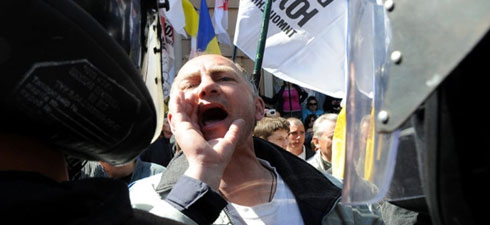"The deal to renew the Russian fleet’s lease in Crimea for another 25 years is a ticking time bomb,” warns the Polish daily Rzeczpospolita on the front page. On 27 April the Ukrainian parliament ratified the agreement in a rather riotous session. "The Ukraine is rapidly increasing its dependence on Russia," warns Rzeczpospolita: the naval deal, it says, "spells the end of Ukrainian sovereignty". The paper goes on to explain that the Ukrainian government agreed to extend the lease in return for a 30% discount on Russian natural gas supplies, and calls on the European Union and the West to spare no efforts to integrate the Ukraine into "their Western structures" and admit the country into the EU. Otherwise, prophesies Rzeczpospolita, the country will be dependent on Russia "for generations to come ". "The Ukraine isn’t dead yet, though it has put the rope around its neck,” concludes the article.
Le Monde, for its part, says Europe is keeping a close eye on the rapprochement between Kiev and Moscow and "noting with some relief that the newly-elected president is sending signals in both directions, seeking to consolidate ties to Moscow without antagonising European capitals". "The 27 see that Mr Yanukovich, right after being elected, reserved his first visit for Brussels rather than Moscow” in early March, continues the French daily, adding that while the Ukrainian parliament was mulling the naval-base-for-gas deal, Yanukovich was in Strasbourg to confirm the Ukraine’s attachment to Europe. "However, Europeans are divided over the question of the Ukraine’s possible EU accession,” points out Le Monde. “The Poles and the British are in favour of eventually enlarging to include the Ukraine, while the Germans and French don’t want to make any promises along those lines.”
On the ground, reports Hospodářské noviny, the Russian advance on Ukrainian soil is not confined to the base-for-gas deal. “Ukrainian is dead, long live Russian,” headlines the Czech daily: ever since Viktor Yanukovich took office, the use of the Russian language has become increasingly widespread, particularly in the mass media and at universities. “The new Ukrainian education minister Dmitrov Tabachnik, famed for his acerbic remarks about western Ukrainians, is to blame,” charges the newspaper, reminding readers that “Ukrainian was marginalised back in the Soviet era” and then gradually re-established after the breakup of the USSR. And “the expansion of the Russian infosphere is the last thing the Ukraine needs now”.
Was this article useful? If so we are delighted!
It is freely available because we believe that the right to free and independent information is essential for democracy. But this right is not guaranteed forever, and independence comes at a cost. We need your support in order to continue publishing independent, multilingual news for all Europeans.
Discover our subscription offers and their exclusive benefits and become a member of our community now!












